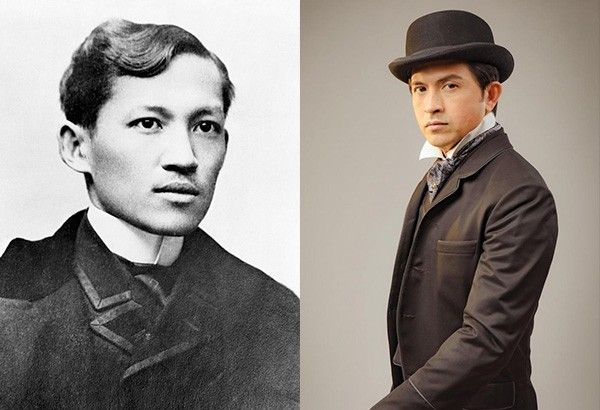Are Jose Rizal and Crisostomo Ibarra one and the same? Professor answers

MANILA, Philippines — One night while watching the hit historical portal fantasy show "Maria Clara at Ibarra," a fellow remarked that Crisostomo Ibarra is Dr. Jose Rizal.
It was an offhand observation, but it inspired a discussion on this very topic that is understandably creating a confusion of some sorts around the fictional hero and the national hero who created his enduring legend.
To answer this question that many viewers of the nightly show have posted on social media, poet, translator and Associate Professor Louie Jon Sanchez of the University of the Philippines shared his insights at last Thursday's "Rizal Revealed: Muling Kilalanin ang Magiting na Bayani" digital conference.
He observed how the similar hairstyle, fashion sense and posture of Dr. Rizal and Crisostomo Ibarra, the hero of his novels, "Noli Me Tangere" and "El Filibusterismo," might have drawn some people to think that they are one and the same.
Prof. Sanchez, however, said that he does not want to join in on the debate because it is tricky and never-ending.
The professor tried to trace the discussion/debate back to the creation of Republic Act No. 1425 or the Rizal Law in 1956 that mandated the inclusion of Rizal's life and works, notably "Noli Me Tangere" and "El Filibusterismo," in teaching in colleges and universities. It was controversial because some sectors, notably those from the religious orders, were against it due to "anti-priest and anti-Church sentiments."
Their objections, however, did not stop the creation of the law and, thus, made Rizal's two novels part of the canon works in Philippine literature. The books also found their way into the nation's culture and consciousness.
"Isang epekto nito ay ang nakasanayang pagtutumbas ng mga character sa nobela sa mga tao sa panahon ni Rizal na sinasabing pinaghalawan o naging inspirasyon ng kanyang karakterisasyon. Maging si Rizal ay paglaon ay naging si Crisostomo Ibarra (One of its effects is people began to equate or think that the characters of the novel were inspired by the people living during Rizal's time. Over time, Rizal became synonymous to Crisostomo Ibarra)," Sanchez noted.
"At sa tingin ko, malaki ang naging ambag, una, ng practice ng mga pagsasadula ng 'Noli' at 'Fili' sa mga klase sa panitikan, at ikalawa, ng kulturang popular sa pagpapalaganap ng ganitong kamalayan (I think the reenactment of "Noli Me Tangere" and "El Filibusterismo" in plays and their exposure in media and popular culture propagated this thought)," he added.
He shared that it is difficult to erase from many people's thinking that Ibarra and Rizal are "twin figures" in the same way that many people who have read his novels think of Maria Clara as the conservative ideal of the Filipina woman. He also added how many people often think of Sisa's plea, calling her children's name, Crispin and Basilio, whenever they are asked about the two novels.
"Napansin n'yo bang halos magkamukha na rin sina Rizal at Ibarra sa katauhan ni Dennis Trillo? Hindi na siguro talaga natin maibubukod ang dalawa at sa tingin ko, okay na rin ito. Sa isang banda, hindi naman talaga basta-basta maihihiwalay ang nobela sa konteksto nito. Kailangan pa rin ang kasaysayan bilang isang produktibong paraan ng pagpapahalaga sa nobela," he noted, referring to how even actor Dennis Trillo, who currently plays Ibarra, looks like both Rizal and his character at the same time.
Sanchez noted how Rizal's brilliance in fighting oppression through his pen contributed to the Philippines' fight for its independence from the Spanish colonizers.
The professor also underscored the fact that the novels are actually comedies. In fact, they are social satires apart from the expected interpretation and reaction to the caricaturish characterization of Dona Victorina and Dona Consolacion.
"Sa maniwala kayo't sa hindi, isa itong nakakatawang nobela lalo na kung mababasa at maituturo nang maigi. Ang dami nitong pinagtatawanan," he stressed.
He cited the sarcasm of Rizal when he described the excitement of the social climbers on the upcoming party at Kapitan Tiago's house to welcome the return of Ibarra who spent seven years studying in Europe as well as his commentary on how the house and its fixtures were designed.
"Masyado tayong sinanay na ang caricaturish na magka-away na character lamang nina Dona Consolacion at Dona Victorina ang mga pangunahing payaso sa mga nobela. Nagwakas sa trahedya ang 'Noli' pero maalingawngaw ang mga halakhak sa pahina. Halakhak ito ng mga naapi laban sa mga mananakop," Sanchez said.
RELATED: Remembering Dr. Jose Rizal: 'Noli Me Tangere,' 'El Filibusterismo' as audio books



















